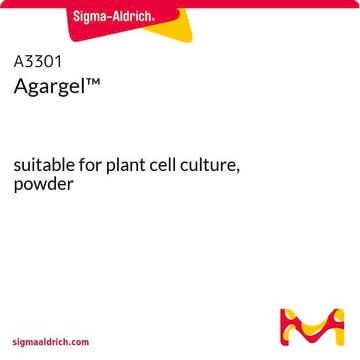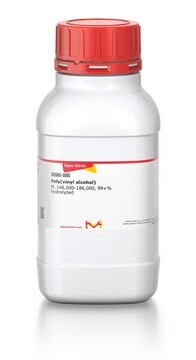P8169
Phytagel™
suitable for plant cell culture, BioReagent, powder
Synonym(s):
Gellan Gum, Agar substitute gelling agent
About This Item
Recommended Products
product line
BioReagent
form
powder
technique(s)
cell culture | plant: suitable
application(s)
agriculture
Looking for similar products? Visit Product Comparison Guide
General description
Application
- in the solidification of culture medium for root assays in Arabidopsis thaliana
- as a component of Solid Paul′s medium for Agrobacterium culture
- as a component of root induction medium in Ilex dumosa tissue culture
Biochem/physiol Actions
Other Notes
Reconstitution
Legal Information
also commonly purchased with this product
Storage Class Code
11 - Combustible Solids
WGK
WGK 2
Flash Point(F)
Not applicable
Flash Point(C)
Not applicable
Personal Protective Equipment
Certificates of Analysis (COA)
Search for Certificates of Analysis (COA) by entering the products Lot/Batch Number. Lot and Batch Numbers can be found on a product’s label following the words ‘Lot’ or ‘Batch’.
Already Own This Product?
Find documentation for the products that you have recently purchased in the Document Library.
Customers Also Viewed
Protocols
Reference guide and preparation guide for antibiotic and antimycotic use in plant tissue culture.
Reference guide and preparation guide for antibiotic and antimycotic use in plant tissue culture.
Reference guide and preparation guide for antibiotic and antimycotic use in plant tissue culture.
Reference guide and preparation guide for antibiotic and antimycotic use in plant tissue culture.
Our team of scientists has experience in all areas of research including Life Science, Material Science, Chemical Synthesis, Chromatography, Analytical and many others.
Contact Technical Service











